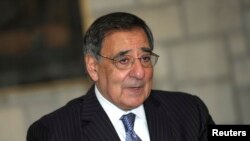Illegal trade along the border between North Korea and China is one of the loopholes in international efforts to deter Pyongyang’s missile development, Leon Panetta, a former CIA director and U.S. defense secretary said.
Panetta’s comments came as Washington is trying to curb Pyongyang’s missile and nuclear programs through strong U.N. sanctions. Last week, the U.N. Security Council unanimously passed a resolution expanding sanctions against Pyongyang in response to the country’s recent nuclear test and long-range missile launch.
“My view is that China has not been directly helping North Korea’s missile development. I think indirectly there have been ways to assist North Korea in their missile development,” Panetta told VOA Monday, referring to illegal trade of banned goods from China to North Korea.
China’s involvement
While serving as secretary of defense, Panetta told the U.S. House Armed Services Committee in 2012 that China was helping North Korea’s missile program.
“I’m sure there’s been some help from China. I don’t know, you know, the exact extent of that,” said the secretary.
Panetta said despite international efforts to tighten sanctions against North Korea, the communist country has found “ways around” the sanctions.
“North Korea has a thriving black market on everything from computers to cognac,” said the former defense chief.
He said blocking illegal trade between the two sides is key to the implementation of the new U.N. sanctions.
“The real question is going to be whether or not that illegal trade continues and North Korea finds other ways to get the supplies they need,” the former defense secretary said.
In an apparent response to the U.N. sanctions, Pyongyang has ratcheted up its nuclear rhetoric. North Korean leader Kim Jong Un has reportedly ordered his military to use its nuclear weapons “at any moment,” according to North Korea’s state media.
Nuclear rhetoric questioned
Panetta questioned whether Pyongyang has the ability to deploy a nuclear warhead on top of an intercontinental ballistic missile, adding the U.S. should not “take anything for granted as to North Korea’s capability.”
When asked about what might have led Beijing to agree to impose the U.N. sanctions, he said China has “lost patience” with North Korea after a series of events, including Pyongyang’s provocative nuclear posture.
The launch of talks in South Korea between Washington and Seoul over the possible deployment of Terminal High Altitude Area Defense (THAAD), an advanced U.S. missile defense system, also might have pressed Beijing to support the sanctions, according to Panetta.
The former CIA director said Kim Jong Un has shown “unpredictable leadership” through a series of purges and executions of top generals and his aides.
Panetta led the CIA from February 2009 to June 2011, and served as secretary of defense from July 2011 to February 2013.
This report was produced in collaboration with VOA Korean Service.






